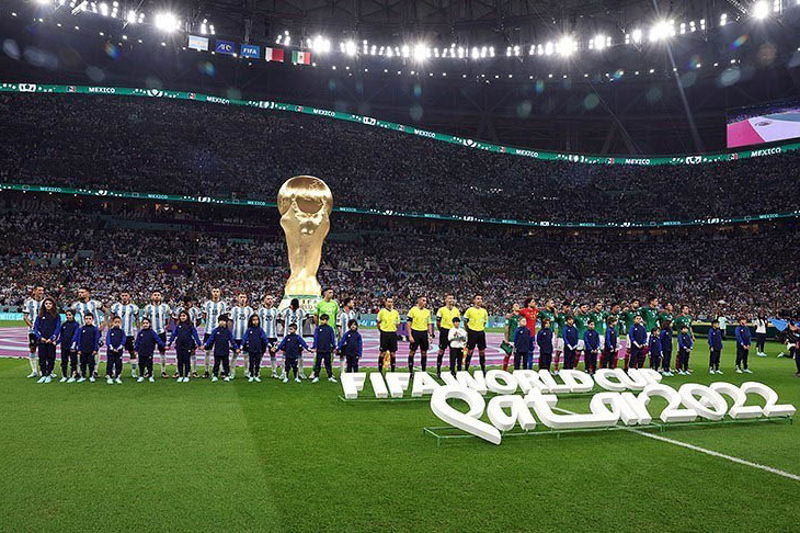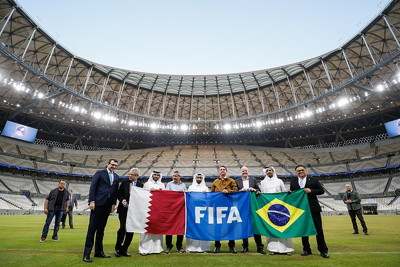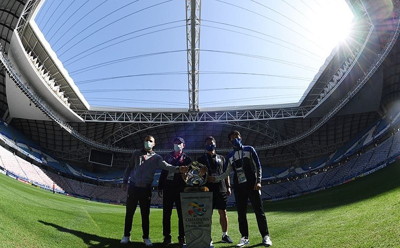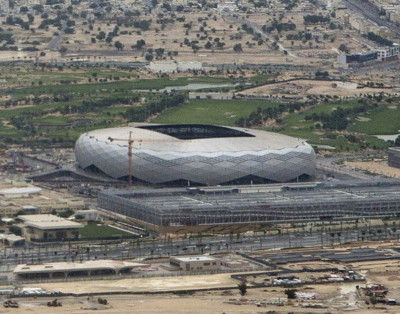
The Middle East is home to some of the most impressive football stadiums in the world.
With that in mind, read on as we look at some of the best stadiums in the region, starting with one which gained worldwide recognition in 2022.
Lusail Stadium – Qatar

The Lusail Stadium in Qatar became the centre of global attraction when it hosted the final of the 2022 World Cup.
The game turned out to be one the most iconic football contests in history as Argentina defeated France on penalties to secure the holy grail for the first time in 36 years.
The stadium was the perfect backdrop for the footballing classic, showing off its eye-catching designs and state-of-the-art features.
It was built to focus on sustainability and has several impressive features, including advanced cooling technology to keep the players and spectators comfortable despite the region’s high temperature.
Owned by the Qatar Football Association, the stadium can hold nearly 90,000 fans, making it one of the biggest stadiums in the region. However, there are plans to reduce its capacity in the future.
King Abdullah Sports City – Saudi Arabia
The King Abdullah Sports City is a massive sports complex in Saudi Arabia. The Jeddah-based venue is home to football but is versatile enough to host other sporting events, including tennis and boxing.
Nicknamed ‘The Jewel’, the stadium can accommodate over 62,000 spectators and is home to two of the biggest clubs in the Saudi Professional League (SPL) – Al-Ittihad and Al-Ahli.
One of the key highlights of the venue is its advanced infrastructure, which includes a top-class Wi-Fi service that provides fans with internet access.
The Wi-Fi helps to support practices such as football wagering, providing fans with easy access to the plethora of betting sites operating in the Middle East.
Many of the brands listed on comparison website arabswin.com offer live odds on Saudi Pro League games, adding a further layer of excitement to watching the action.
Al-Janoub Stadium – Qatar
 Qatar’s Al-Janoub Stadium hosted seven fixtures during the 2022 World Cup, including a round-of-16 clash between Japan and Croatia.
Qatar’s Al-Janoub Stadium hosted seven fixtures during the 2022 World Cup, including a round-of-16 clash between Japan and Croatia.
The 44,000-capacity venue is dwarfed by Lusail Stadium. However, its unique design separates it from the rest, particularly its impressive retractable roof.
Al-Janoub is one of Qatar’s most technologically advanced stadiums and is home to two-time Qatari champions Al-Wakrah.
It has advanced air conditioning systems that keep the players and the fans comfortable despite the region’s temperature.
The fan experience at the stadium is top-notch. The venue offers easy access, excellent seating arrangements and plenty of amenities to make matchdays more comfortable and exciting.
Hazza Bin Zayed Stadium – United Arab Emirates
The Hazza Bin Zayed Stadium in the United Arab Emirates (UAE) is another modern venue that has made its mark on Middle Eastern football.
The 22,000-capacity stadium is home to the current Asian Football Confederation (AFC) Champions League winners – Al-Ain.
The Abu Dhabi-based venue is one of the most sophisticated stadiums in the region. Its exterior design is a unique pattern inspired by palm trees, symbolising life and sustainability in the desert.
The stadium was designed to shield the pitch from the desert sun to ensure players always bring their ‘A-game’ while spectators are comfortable in the stands.
One of the best parts about the stadium is how close fans feel to the action. The steep seating layout brings fans closer to the pitch, allowing them to electrify the atmosphere while supporting the team.
Education City Stadium – Qatar
 Qatar’s Education City Stadium rounds off the list, but that does not mean it is inferior to the other grounds – not by any stretch of the imagination.
Qatar’s Education City Stadium rounds off the list, but that does not mean it is inferior to the other grounds – not by any stretch of the imagination.
It is one of the high-tech stadiums commissioned by Qatar for the 2022 World Cup. It hosted eight fixtures during the showpiece, including the quarter-final between Croatia and Brazil.
Located just outside the capital city of Doha, the stadium is considered one of the most environmentally friendly venues in the world.
The 40,000-capacity venue is designed with a focus on sustainability and uses energy-saving systems to reduce its carbon footprint.
Nicknamed ‘Diamond of the Desert’, the stadium also has an advanced Wi-Fi system that allows fans to stay connected to the internet while the match unfolds.
